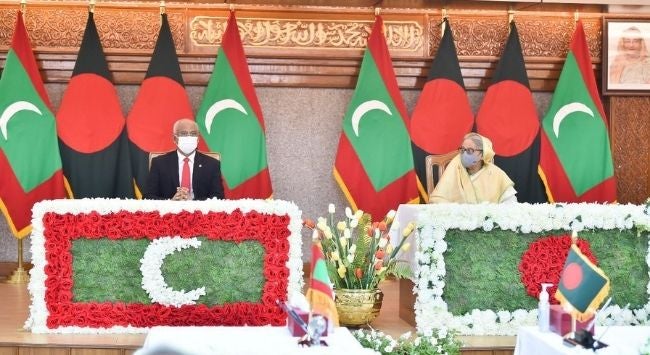Bangladesh-Maldives Relations: Geopolitical and Economic Potentials
Ramita Iyer, Mohammad Masudur Rahman
10 March 2022Summary
In the face increasing India-China rivalry, the smaller countries in South Asia will need to devise means to reduce their reliance on Beijing and New Delhi and effectively balance ties with the two giants in their path to economic development. In this respect, Bangladesh seems to have found a new way promoting its interests independent of the two powers. These include extending loans to smaller countries in the subcontinent, investing overseas and progressively signing preferential trade agreements to enhance bilateral trade and investment cooperation. The recent visit by Bangladesh Prime Minister Sheikh Hasina to the Maldives will strengthen bilateral cooperation and have a positive spillover effect in South Asian geopolitics.
In December 2021, Bangladesh Prime Minister Sheikh Hasina made her first official visit to the Maldives. With the two-day visit to Malé coming just months after the Maldives’ President Ibrahim Solih visited Dhaka, the meeting was clearly reflective of deepening bilateral ties between the two countries.
During the visit, Hasina and Solih reviewed the existing agreements between the two countries. In a Joint Communique detailing Hasina’s trip to the Maldives, they expressed their openness to expand the areas of cooperation to include new avenues like trade, investment, connectivity, health, culture, agriculture, information and communication technology, human resources development and consular and community welfare. They also signed several new memoranda of understanding in the areas of sports and development, migrant workers and avoidance of double taxation, in addition to renewing contracts relating to healthcare and medical sciences. Notably, Bangladesh has extended a loan of US$200 million (S$272 million) to the Maldives and donated 13 military vehicles to the Maldivian armed forces.
Bangladesh and the Maldives share much in common. As Hasina noted at the state banquet organised by Solih, “Bangladesh and the Maldives share religious values, cultural affinity and stand on the same plane of developmental aspiration.” Despite some setbacks, both countries have made significant progress in their relationship over the years. With their first bilateral consultations at the Foreign Secretary-level held as recently as November 2021 in Malé, both now have a host of bilateral commitments across several important sectors.
For both Dhaka and Malé, strengthening bilateral ties with countries in the South Asian region is of utmost importance. The Maldives faces a geopolitical dilemma in balancing its relations between the two big powers in the region – India and China. While the country had, for the longest time, adopted an India-first approach in its foreign policy, this was reversed by Abdullah Yameen when he became President in 2013. His departure from an India-first approach and the introduction of several China-friendly policies is famously known. In 2018, he lost the presidential elections to Solih.
In recent times, Yameen’s ‘India-Out’ campaign has garnered popular support, calling to question the Maldivian position on its relations with India and China. During a time of increasing competition between India and China in South Asia, including in the strategically located island state of the Maldives where they are competing for the position of primary provider, Malé’s engagements with third countries make strategic sense. Added to these geopolitical complications, the Maldives also has a large outstanding debt. Thus, Bangladesh offers the promise of a neutral foreign partner for loans and investments.
Bangladesh’s bilateral engagements are also guided by its economic and geopolitical considerations. On the geopolitical front, Dhaka, like Malé, has faced a waxing and waning relationship with New Delhi and Beijing, driven primarily by changes in its domestic politics. With large Chinese investments in recent years and long-standing ties with India, stable and positive relations with both countries are crucial for Bangladesh. Economically, Bangladesh’s actions are reflective of its emergence as an economic power and middle-income country. Today, it possesses large foreign exchange reserves and the capacity to provide economic support to other smaller countries in the region. With loans extended to Sri Lanka and the Maldives, Bangladesh has quickly transformed from an external financial support seeker to a loan provider. Importantly, with Bangladesh’s impending graduation from the United Nation’s list of Least Developed Countries in 2026, Dhaka’s deepening of socio-economic and diplomatic relations with other countries in the region and beyond are a cogent step.
Hasina’s successful visit to the Maldives also points to a more significant trend in South Asia, where smaller countries are moving away from over-reliance on India as the sole security and resource provider in the region. In this respect, Bangladesh has begun to emerge as an important partner to the smaller South Asian countries at the back of its incredible growth story. The growing India-China rivalry provides further impetus to the smaller nations in the region to band together in their efforts to balance relations with the two giants while pushing for economic growth.
Hasina’s recent visit offers the potential for the further strengthening of bilateral ties between Bangladesh and the Maldives. What remains to be seen is the extent to which this potential is tapped by both sides to promote their economic interests and maintain geopolitical stability in the region.
. . . . .
Ms Ramita Iyer is a Research Analyst at the Institute of South Asian Studies (ISAS), an autonomous research institute at the National University of Singapore (NUS). She can be contacted at ramita.iyer@nus.edu.sg. Dr Mohammad Masudur Rahman is a Visiting Research Fellow at the same institute. He can be contacted at isasmmr@nus.edu.sg. The authors bear full responsibility for the facts cited and opinions expressed in this paper.
Photo Credit: Abdulla Shahid’s Twitter
-
 More From :
More From :
-
 Tags :
Tags :
-
 Download PDF
Download PDF



